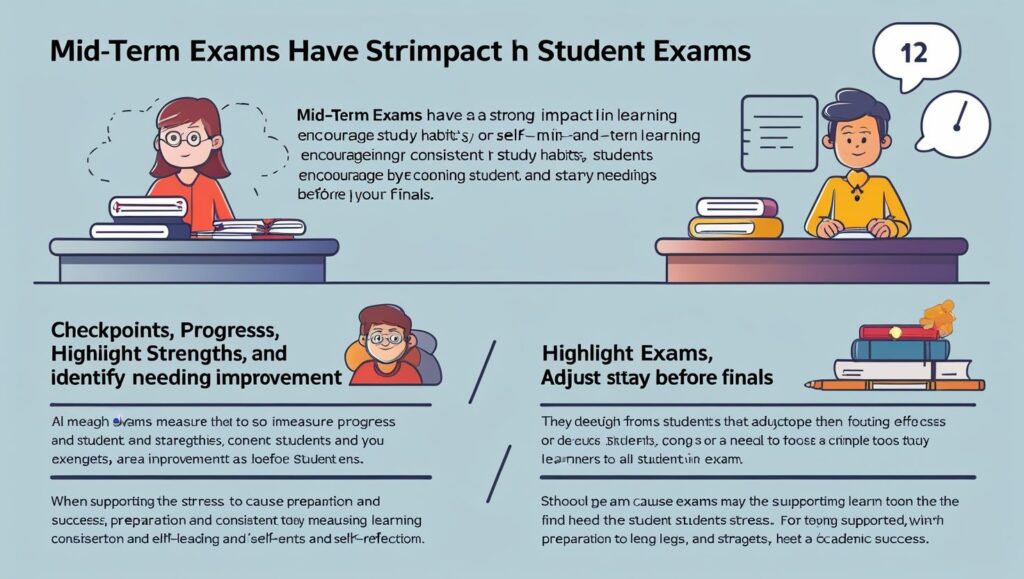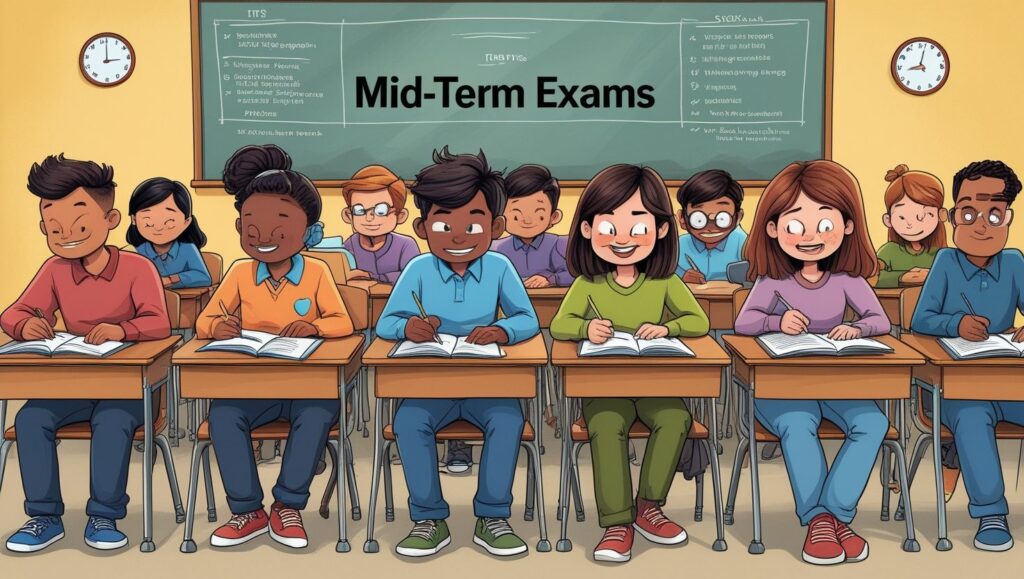Introduction
Mid-term exams play a significant role in the educational journey of students. They are usually conducted in the middle of an academic term to assess knowledge, skills, and understanding. These exams help both teachers and students evaluate progress and identify strengths and weaknesses. Moreover, mid-terms serve as checkpoints, allowing students to measure how well they have absorbed the material so far. Teachers, on the other hand, use the results to adjust lesson plans and teaching strategies. Importantly, mid-term exams also prepare students for final exams by providing practice under timed and structured conditions.
Although some critics argue that exams create stress, many educators believe they motivate learners to stay consistent in their studies. When used effectively, mid-term exams support learning, encourage discipline, and promote long-term academic success. Therefore, understanding their impact is crucial for improving teaching practices and ensuring better learning outcomes.
Understanding the Purpose of Mid-Term Exams
Mid-term exams are designed to provide feedback to both students and teachers. Their primary purpose is to assess how much content students have learned within the first half of a term. Additionally, these exams encourage consistent study habits instead of last-minute cramming before finals. They also provide teachers with valuable data, showing which topics need reinforcement. Furthermore, mid-term exams function as diagnostic tools, identifying gaps in knowledge and guiding targeted interventions. Beyond academics, they help students practice time management and stress management skills, both of which are essential for success in higher education and professional life.
Another purpose is accountability, as exams demonstrate whether students are meeting the expected learning outcomes. Importantly, mid-term exams are not meant to punish but to guide learning. When teachers explain this purpose clearly, students begin to view exams as opportunities for growth rather than as intimidating obstacles.

Mid-Term Exams as a Learning Tool
Mid-term exams should not be seen only as assessments but also as valuable learning tools. Preparing for exams encourages students to review lessons, organize notes, and engage in active recall. These activities strengthen memory retention and improve understanding. Additionally, mid-terms motivate students to adopt effective study strategies, such as summarizing, self-testing, and group discussions. Moreover, the exam process provides feedback on the effectiveness of teaching methods. If many students struggle with similar concepts, teachers can adjust instruction. Furthermore, exams help develop essential academic skills like critical thinking, problem-solving, and analytical writing.
Importantly, when students review exam results, they gain insight into mistakes and misconceptions. This reflective process enhances learning and prepares them for future assessments. In this way, mid-term exams contribute significantly to the cycle of teaching and learning. They are not just tests of knowledge but opportunities to build stronger academic foundations.
The Role of Feedback in Student Improvement
Feedback is one of the most important outcomes of mid-term exams. Students gain valuable information about their strengths and areas for improvement. This feedback allows them to adjust study strategies and focus on weaker subjects before final exams. Moreover, teachers benefit by identifying common problem areas within the class. They can then re-teach difficult concepts or provide supplementary resources. Additionally, effective feedback should go beyond grades. Teachers can offer detailed explanations, suggestions, and encouragement to help students grow. Furthermore, feedback builds a sense of accountability.
Students become aware of their responsibilities and recognize the importance of effort and consistency. Importantly, timely feedback ensures that students do not repeat the same mistakes in future assignments or exams. When feedback is constructive, students view it as support rather than criticism. Thus, mid-term exams become stepping stones for improvement, guiding learners toward academic success and personal growth.
Impact on Student Motivation and Discipline
Mid-term exams significantly influence student motivation and discipline. Knowing that exams are approaching encourages students to stay consistent with their studies. Instead of postponing learning, they are motivated to revise regularly and maintain organized notes. Furthermore, the structure of exams promotes discipline, as students must manage time effectively during preparation. For many learners, exams act as reminders of accountability, ensuring that they take responsibility for progress.
Additionally, achieving good results can boost confidence and encourage continued effort. On the other hand, poor performance may serve as a wake-up call, pushing students to adopt better study habits. Importantly, mid-term exams also prepare students for future academic challenges, such as final exams, standardized tests, or professional assessments. By fostering motivation and discipline, these exams contribute to long-term educational development. Therefore, mid-term exams are not only evaluations but also catalysts for responsible and determined learning behavior.

Challenges and Stress Factors of Mid-Term Exams
Despite their benefits, mid-term exams also present challenges. Many students experience stress, anxiety, and pressure during exam preparation. This emotional strain may affect concentration and performance. Furthermore, students with test anxiety may perform poorly even if they understand the material. In some cases, the focus on memorization over deep understanding creates frustration. Additionally, balancing exam preparation with other academic responsibilities can overwhelm students. Teachers also face challenges in designing fair exams that truly reflect learning objectives. Moreover, inequality in resources, such as access to study materials or tutoring, can widen achievement gaps.
Importantly, excessive emphasis on grades may discourage creativity and reduce intrinsic motivation. While exams encourage discipline, they can also create fear if not managed well. Therefore, schools must implement strategies to reduce stress, such as providing study guides, offering counseling support, and fostering a positive mindset about exams.
Mid-Term Exams and Academic Performance
Research suggests that mid-term exams have a direct impact on academic performance. Students who take mid-term exams tend to perform better in final assessments. This improvement occurs because mid-terms encourage early review, reducing the need for last-minute cramming. Furthermore, repeated exposure to exam conditions strengthens problem-solving skills and resilience. Mid-terms also reinforce memory by requiring students to recall and apply knowledge under pressure.
Additionally, they serve as checkpoints, enabling teachers to adjust curriculum pacing and focus on difficult areas. Importantly, mid-term exams create opportunities for students to identify gaps in knowledge well before final evaluations. By addressing these gaps, learners improve overall performance. However, performance gains depend on how exams are designed. Fair, comprehensive, and balanced exams yield better outcomes than those focusing only on memorization. Ultimately, when implemented thoughtfully, mid-term exams serve as powerful tools to enhance academic achievement and prepare students for lifelong learning.
Strategies for Effective Mid-Term Exam Preparation
Preparing for mid-term exams requires careful planning and effective strategies. First, students should create a study schedule that breaks down material into manageable sections. Consistent review prevents last-minute stress and enhances retention. Moreover, active learning techniques such as self-quizzing, flashcards, and group discussions strengthen understanding. Teachers can also support students by providing study guides, practice tests, and review sessions. Furthermore, setting specific goals helps learners stay focused and motivated.
Time management is crucial, so students should balance study sessions with rest and relaxation. Additionally, healthy habits such as proper sleep, exercise, and nutrition contribute to better concentration. Importantly, students should practice mindfulness or relaxation techniques to manage exam stress. Collaborative learning is another powerful tool, as peers can clarify concepts and encourage accountability. By combining these strategies, students can prepare effectively, reduce anxiety, and achieve higher performance. Thus, preparation transforms exams into positive learning experiences.

Alternatives and Complementary Assessment Methods
While mid-term exams are important, they should not be the only method of assessment. Complementary strategies such as projects, presentations, portfolios, and group assignments provide a more comprehensive view of student learning. These alternatives encourage creativity, collaboration, and real-world application of knowledge. Moreover, continuous assessment throughout the semester reduces pressure by spreading evaluation across multiple tasks. Teachers can also use formative assessments like quizzes, reflections, or peer evaluations to provide ongoing feedback.
Importantly, combining exams with other methods ensures fairness, as students have different learning styles and strengths. For example, some may excel in written exams, while others perform better in practical demonstrations. Furthermore, diverse assessments foster skills beyond memorization, such as problem-solving, communication, and critical thinking. By blending mid-term exams with alternative assessments, educators create balanced systems that measure both academic knowledge and practical competencies, ensuring holistic student development.
Conclusion
The impact of mid-term exams on student learning is both significant and multifaceted. These exams provide feedback, motivate discipline, and strengthen academic skills. They also act as checkpoints, allowing both teachers and students to measure progress. While challenges such as stress and test anxiety exist, effective preparation and supportive teaching strategies can reduce these issues. Furthermore, mid-term exams should be integrated with alternative assessments to create well-rounded evaluation systems.
When used thoughtfully, mid-term exams enhance learning, boost confidence, and improve final performance. Importantly, they prepare students not only for academic success but also for lifelong skills such as time management, resilience, and self-reflection. Ultimately, the goal of mid-term exams is not merely to test knowledge but to support growth. Therefore, educators and students must view them as opportunities for improvement, learning, and achievement rather than as sources of fear or pressure.
References
- Black, P., & Wiliam, D. (1998). Assessment and Classroom Learning. Assessment in Education: Principles, Policy & Practice, 5(1), 7–74.
- Nicol, D. J., & Macfarlane‐Dick, D. (2006). Formative Assessment and Self‐Regulated Learning. Studies in Higher Education, 31(2), 199–218.
- Brookhart, S. M. (2017). How to Give Effective Feedback to Your Students. ASCD.
- McMillan, J. H. (2013). Classroom Assessment: Principles and Practice for Effective Standards-Based Instruction. Pearson.
- Race, P. (2014). The Lecturer’s Toolkit: A Practical Guide to Assessment, Learning and Teaching. Routledge.

Thanks for sharing superb informations. Your web site is very cool. I am impressed by the details that you have on this site. It reveals how nicely you understand this subject. Bookmarked this web page, will come back for more articles. You, my pal, ROCK! I found just the info I already searched all over the place and just could not come across. What a perfect web site.
We’re a bunch of volunteers and starting a new scheme in our community. Your site offered us with helpful information to paintings on. You have done a formidable process and our entire community can be grateful to you.
Hey! Someone in my Facebook group shared this website with us so I came to take a look. I’m definitely enjoying the information. I’m bookmarking and will be tweeting this to my followers! Excellent blog and terrific design and style.
magnificent publish, very informative. I’m wondering why the opposite specialists of this sector don’t realize this. You should proceed your writing. I’m confident, you have a huge readers’ base already!
I wanted to thank you for this great read!! I definitely enjoying every little bit of it I have you bookmarked to check out new stuff you post…
Loving the information on this internet site, you have done outstanding job on the content.
An interesting discussion is worth comment. I think that you should write more on this topic, it might not be a taboo subject but generally people are not enough to speak on such topics. To the next. Cheers
Great awesome issues here. I am very happy to peer your article. Thanks so much and i’m taking a look ahead to touch you. Will you kindly drop me a mail?
Some truly wonderful info , Gladiola I detected this. “Perfect valor is to behave, without witnesses, as one would act were all the world watching.” by La Rochefoucauld.
Valuable information. Fortunate me I discovered your web site accidentally, and I am shocked why this accident did not took place in advance! I bookmarked it.
Pretty nice post. I just stumbled upon your weblog and wished to say that I’ve really enjoyed browsing your blog posts. In any case I’ll be subscribing to your feed and I hope you write again very soon!
hkhwsv
Make mornings more adorable with this Hello Kitty alarm clock CD player. Ideal for kids and collectors alike, this charming CD clock radio includes all the basics: AM/FM radio, programmable CD playback, and reliable alarm settings. Wake up to your favorite CD or a cheerful radio station with built-in stereo sound. A large digital display and simple controls make it easy to use, even for younger users. Combining cuteness with functionality, it’s a top pick among themed alarm clocks with CD players that bring fun and joy to your space.
продажа аккаунтов купить аккаунт
услуги по продаже аккаунтов магазин аккаунтов социальных сетей
продажа аккаунтов https://magazin-akkauntov-online.ru/
маркетплейс аккаунтов профиль с подписчиками
купить аккаунт биржа аккаунтов
магазин аккаунтов купить аккаунт
перепродажа аккаунтов https://pokupka-akkauntov-online.ru
Account Acquisition buyverifiedaccounts001.com
Account Store Account trading platform
Sell accounts Secure Account Sales
Website for Buying Accounts Verified Accounts for Sale
Account Trading Platform Website for Buying Accounts
Database of Accounts for Sale Online Account Store
Marketplace for Ready-Made Accounts Account Market
Marketplace for Ready-Made Accounts Account market
Sell Account Account Trading
Accounts market Purchase Ready-Made Accounts
Buy accounts Account Sale
Highly descriptive article, I liked that a lot.
Will there be a part 2?
Check out my page … nordvpn coupons inspiresensation (http://t.co)
buy accounts accountsmarketplaceonline.com
account trading platform gaming account marketplace
purchase ready-made accounts sell account
profitable account sales find accounts for sale
website for selling accounts marketplace for ready-made accounts
buy accounts sell account
buy pre-made account purchase ready-made accounts
account trading service https://accountsmarketdiscount.com
purchase ready-made accounts purchase ready-made accounts
buy and sell accounts buy accounts
website for selling accounts secure account sales
account trading platform account trading platform
buy accounts profitable account sales
account selling service accounts market
account catalog guaranteed accounts
account exchange sell pre-made account
account trading service gaming account marketplace
database of accounts for sale social media account marketplace
account exchange service sell accounts
account market database of accounts for sale
account acquisition buy accounts
account selling service account marketplace
secure account sales account exchange
secure account purchasing platform secure account purchasing platform
buy and sell accounts website for selling accounts
accounts for sale gaming account marketplace
buy accounts gaming account marketplace
account exchange service account catalog
buy accounts https://accounts-offer.org
verified accounts for sale account market
marketplace for ready-made accounts accounts market
buy accounts accounts marketplace
account trading service account marketplace
gaming account marketplace https://social-accounts-marketplace.xyz
accounts marketplace https://buy-accounts.space
secure account purchasing platform https://buy-accounts-shop.pro
account acquisition https://accounts-marketplace.art/
account purchase https://social-accounts-marketplace.live
account trading service https://buy-accounts.live
profitable account sales https://accounts-marketplace.online
buy and sell accounts https://accounts-marketplace-best.pro
площадка для продажи аккаунтов akkaunty-na-prodazhu.pro
биржа аккаунтов https://kupit-akkaunt.xyz/
биржа аккаунтов rynok-akkauntov.top
маркетплейс аккаунтов соцсетей akkaunt-magazin.online
маркетплейс аккаунтов соцсетей https://akkaunty-market.live/
маркетплейс аккаунтов соцсетей https://kupit-akkaunty-market.xyz
продать аккаунт akkaunty-optom.live
продать аккаунт https://online-akkaunty-magazin.xyz/
продажа аккаунтов https://akkaunty-dlya-prodazhi.pro
магазин аккаунтов маркетплейсов аккаунтов
fb account for sale https://buy-adsaccounts.work
facebook ads accounts https://buy-ad-account.top
buy fb account buy facebook accounts for advertising
buy facebook accounts buy fb account
buying facebook accounts https://ad-account-buy.top
cheap facebook account facebook ad account buy
buy aged facebook ads accounts https://ad-account-for-sale.top
buying facebook ad account https://buy-ad-account.click
В этой статье собраны факты, которые освещают целый ряд важных вопросов. Мы стремимся предложить читателям четкую, достоверную информацию, которая поможет сформировать собственное мнение и лучше понять сложные аспекты рассматриваемой темы.
Подробнее – https://medalkoblog.ru/
buying facebook accounts https://ad-accounts-for-sale.work
buy aged google ads accounts https://buy-ads-account.top
buy facebook ads account https://buy-accounts.click
buy google agency account https://buy-ads-accounts.click
google ads account for sale https://ads-account-for-sale.top
buy google ads account https://ads-account-buy.work
buy google ads verified account google ads account for sale
buy verified google ads account buy google adwords account
buy google ads invoice account https://buy-ads-agency-account.top
buy google ad account https://sell-ads-account.click
google ads account for sale https://buy-verified-ads-account.work
buy fb bm buy-business-manager.org
buy google ads threshold accounts https://ads-agency-account-buy.click
facebook business manager for sale https://buy-business-manager-acc.org
fb bussiness manager buy-bm-account.org
buy fb business manager facebook bm buy
facebook business account for sale buy-verified-business-manager.org
buy verified business manager facebook https://buy-business-manager-verified.org
buy facebook business manager account buy bm facebook
unlimited bm facebook https://buy-bm.org/
buy facebook business manager https://verified-business-manager-for-sale.org
verified bm for sale https://buy-business-manager-accounts.org/
buy tiktok ad account https://buy-tiktok-ads-account.org
tiktok agency account for sale https://tiktok-ads-account-buy.org
tiktok ad accounts https://tiktok-ads-account-for-sale.org
buy tiktok business account https://buy-tiktok-ad-account.org
buy tiktok ad account https://tiktok-agency-account-for-sale.org
buy tiktok ads https://buy-tiktok-ads-accounts.org
tiktok ad accounts tiktok ad accounts
tiktok ad accounts https://buy-tiktok-ads.org
buy tiktok ad account https://tiktok-ads-agency-account.org
Very fantastic info can be found on site.
I’m not sure why but this blog is loading very slow for me. Is anyone else having this issue or is it a problem on my end? I’ll check back later and see if the problem still exists.
Hi there would you mind sharing which blog platform you’re using? I’m going to start my own blog in the near future but I’m having a tough time making a decision between BlogEngine/Wordpress/B2evolution and Drupal. The reason I ask is because your layout seems different then most blogs and I’m looking for something completely unique. P.S Apologies for being off-topic but I had to ask!
buy fb ad account accounts for sale account buying service
buy facebook old accounts verified accounts for sale social media account marketplace
The root of your writing whilst sounding reasonable in the beginning, did not really sit properly with me personally after some time. Someplace within the paragraphs you actually were able to make me a believer unfortunately just for a short while. I nevertheless have a problem with your leaps in assumptions and one might do well to fill in those gaps. When you can accomplish that, I could certainly end up being fascinated.
Excellent read, I just passed this onto a colleague who was doing some research on that. And he just bought me lunch as I found it for him smile Therefore let me rephrase that: Thank you for lunch! “Do you want my one-word secret of happiness–it’s growth–mental, financial, you name it.” by Harold S. Geneen.
I think this is among the most important information for me. And i’m glad reading your article. But should remark on few general things, The website style is ideal, the articles is really nice : D. Good job, cheers
Hello There. I discovered your blog the use of msn. This is a really well written article. I will make sure to bookmark it and come back to read extra of your useful info. Thank you for the post. I’ll definitely return.
Производство экологичных аксессуаров для дома из дерева популярно.
Это модно и уютно.
my web site … ulster university blackboard
Эта информационная заметка содержит увлекательные сведения, которые могут вас удивить! Мы собрали интересные факты, которые сделают вашу жизнь ярче и полнее. Узнайте нечто новое о привычных аспектах повседневности и откройте для себя удивительный мир информации.
Детальнее – https://quick-vyvod-iz-zapoya-1.ru/
you’re really a good webmaster. The website loading speed is incredible. It seems that you are doing any unique trick. Also, The contents are masterpiece. you have done a fantastic job on this topic!
Really excellent visual appeal on this web site, I’d value it 10 10.